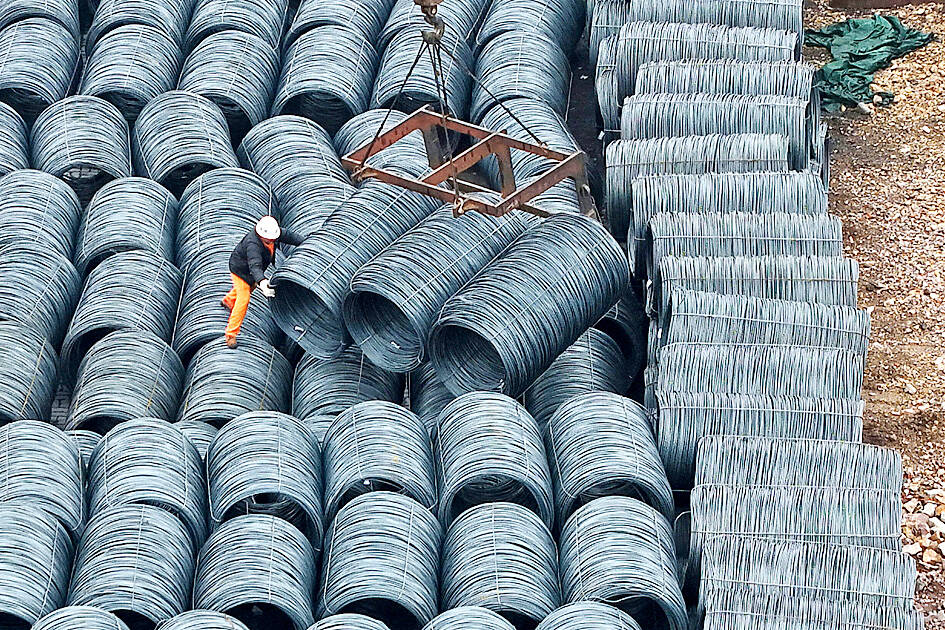Vietnam would impose anti-dumping tariffs on steel from China, following South Korea and other nations in fighting back against surging supplies from the world’s biggest producer.
Hanoi would impose temporary tariffs on some hot-rolled coils beginning early next month, the Vietnamese Ministry of Industry and Trade said on Friday.
Outside China, Vietnam is the biggest single buyer of Chinese steel, and hot-rolled coil is a major export product.

Photo: AFP
China sent the most steel overseas in nine years last year, as its producers turned to global markets to offset a deep construction slowdown at home.
That set the stage for US President Donald Trump to propose a blanket 25 percent tariff on all US imports, and has prompted nations from South Korea to Brazil and India to consider levies.
Trump’s tariffs are motivated mostly by concerns that China is flooding the global market and harming US manufacturing, said Kate Kalutkiewicz, former senior director for international trade policy at the US National Economic Council during Trump’s first term.
“They almost entirely relate to China, and China’s non-market policies and practices which have enabled this global glut,” she said. The tariffs are due to take effect on March 12.
The flurry of protectionism would pile pressure on Beijing to rein in its billion-ton steel industry after several years of slowing domestic demand.
Recent tariff decisions “should incentivize the Chinese government to launch another round of supply reform” to boost supply discipline and improve industry profitability, Citigroup Inc analysts led by Jack Shang (尚游) wrote in a note.
Vietnam’s temporary tariffs of between 19.38 percent and 27.83 percent would come into force on Friday next week and last 120 days.
China exported about 8 million tonnes of hot-rolled coils to Vietnam last year, and the tariffs would likely cover about 50 percent of that volume, Citigroup said, citing discussions with industry players.
The anti-dumping probe was triggered by Hoa Phat Group and Formosa Ha Tinh Steel Corp (台塑河靜鋼鐵興業), two major Vietnamese steelmakers who requested an investigation of imports from India and China last year. The government would not go ahead with duties on India at this moment, it said.

Sweeping policy changes under US Secretary of Health and Human Services Robert F. Kennedy Jr are having a chilling effect on vaccine makers as anti-vaccine rhetoric has turned into concrete changes in inoculation schedules and recommendations, investors and executives said. The administration of US President Donald Trump has in the past year upended vaccine recommendations, with the country last month ending its longstanding guidance that all children receive inoculations against flu, hepatitis A and other diseases. The unprecedented changes have led to diminished vaccine usage, hurt the investment case for some biotechs, and created a drag that would likely dent revenues and

Global semiconductor stocks advanced yesterday, as comments by Nvidia Corp chief executive officer Jensen Huang (黃仁勳) at Davos, Switzerland, helped reinforce investor enthusiasm for artificial intelligence (AI). Samsung Electronics Co gained as much as 5 percent to an all-time high, helping drive South Korea’s benchmark KOSPI above 5,000 for the first time. That came after the Philadelphia Semiconductor Index rose more than 3 percent to a fresh record on Wednesday, with a boost from Nvidia. The gains came amid broad risk-on trade after US President Donald Trump withdrew his threat of tariffs on some European nations over backing for Greenland. Huang further

CULPRITS: Factors that affected the slip included falling global crude oil prices, wait-and-see consumer attitudes due to US tariffs and a different Lunar New Year holiday schedule Taiwan’s retail sales ended a nine-year growth streak last year, slipping 0.2 percent from a year earlier as uncertainty over US tariff policies affected demand for durable goods, data released on Friday by the Ministry of Economic Affairs showed. Last year’s retail sales totaled NT$4.84 trillion (US$153.27 billion), down about NT$9.5 billion, or 0.2 percent, from 2024. Despite the decline, the figure was still the second-highest annual sales total on record. Ministry statistics department deputy head Chen Yu-fang (陳玉芳) said sales of cars, motorcycles and related products, which accounted for 17.4 percent of total retail rales last year, fell NT$68.1 billion, or

HSBC Bank Taiwan Ltd (匯豐台灣商銀) and the Taiwan High Prosecutors Office recently signed a memorandum of understanding (MOU) to enhance cooperation on the suspicious transaction analysis mechanism. This landmark agreement makes HSBC the first foreign bank in Taiwan to establish such a partnership with the High Prosecutors Office, underscoring its commitment to active anti-fraud initiatives, financial inclusion, and the “Treating Customers Fairly” principle. Through this deep public-private collaboration, both parties aim to co-create a secure financial ecosystem via early warning detection and precise fraud prevention technologies. At the signing ceremony, HSBC Taiwan CEO and head of banking Adam Chen (陳志堅)